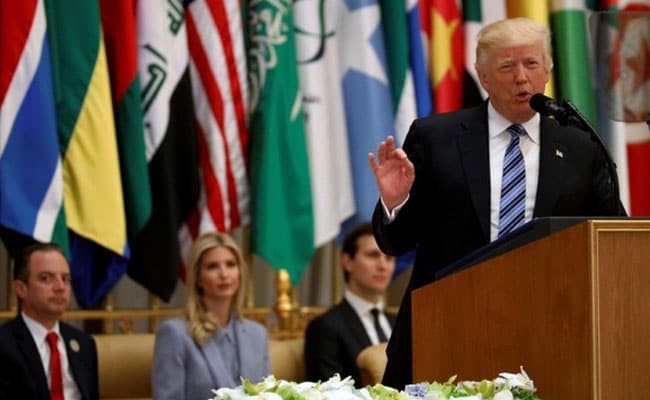Speaking at the Arab-Islamic-US summit in Riyadh, Donald Trump termed the fight against terrorism as a "battle between good and evil," and not a clash between "the West and Islam."

Donald Trump asked the Muslim world to confront "the crisis of Islamic extremism." (Reuters)
Riyadh: US President Donald Trump on Sunday named India among the countries that had suffered terror, as he addressed the Arab-Islamic-US summit. He said that countries must ensure that terror groups didn't find sanctuary on their soil.
"The nations of Europe have also endured unspeakable horror, so too have nations of Africa and South America, India, Russia, China, Australia have all been victims," Mr Trump said.
Without naming Pakistan, the US President said "every nation has an absolute duty to ensure that terrorists find no quarter on their soil."
Mr Trump was addressing the leaders of 50 Muslim-majority countries on Sunday afternoon in his first speech on foreign soil.
America, he said, had suffered repeated barbaric attacks, from September 11 to the Boston bombings and the Orlando attack.
Terming the fight against terrorism as a "battle between good and evil," and not a clash between "the West and Islam," Mr Trump sought to chart a new course for America's role in the region - aimed at rooting out terrorism.
"This is not a battle between different faiths, different sects, or different civilisations," he said. "This is a battle between barbaric criminals who seek to obliterate human life, and decent people of all religions who seek to protect it. This is a battle between good and evil."
He called on the Middle-eastern countries to combat Islamic extremism, pointing out that "95 per cent of the victims of terrorist attacks are themselves Muslims."
He said, "We must be united to conquer extremism...young Muslim boys and girls should be able to grow up without fear."
Urging Muslim leaders to do more to fight extremism, the US President said, "The nations of the Middle East cannot wait for American power to crush this enemy for them. The nations of the Middle East will have to decide what kind of future they want for themselves, for their countries and for their children."
 Share
Share




0 comments:
Post a Comment